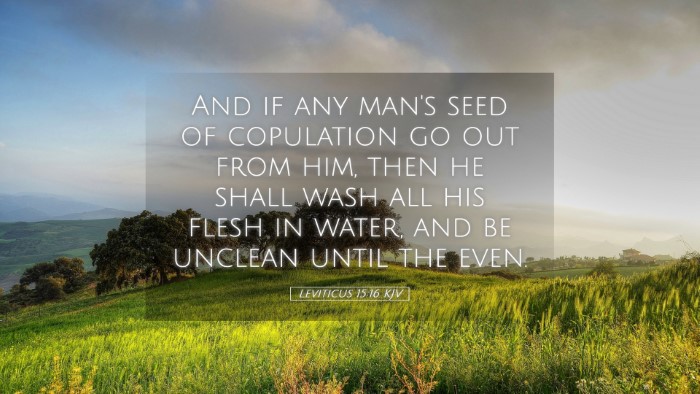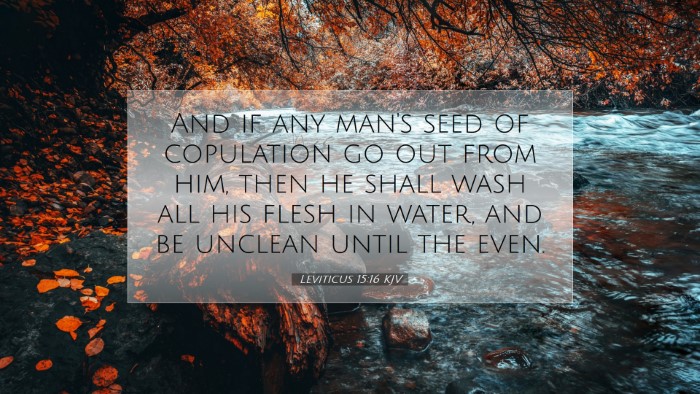Commentary on Leviticus 15:16
Leviticus 15:16 states:
"And if any man's seed of copulation go out from him, then he shall wash all his flesh in water, and be unclean until the evening."
Contextual Overview
This verse is part of the Holiness Code in Leviticus, which contains regulations regarding purity, ritual cleanliness, and the differences between holy and common.
The concept of bodily emissions and their associated legal injunctions were crucial for the Israelites, as they emphasized both physical and spiritual cleanliness in their covenant relationship with God.
Matthew Henry’s Insights
According to Matthew Henry, the emphasis on washing and the resulting uncleanness until the evening serves to underline the seriousness with which the law addresses issues of holiness and purity.
Henry points out that these regulations illustrate the broader theme of how every aspect of life is subject to God’s laws; they are not merely ceremonial but reflect a deeper spiritual reality.
-
Physical Implications: The washing signifies a necessary step for cleansing, thus teaching that sanctification requires action and obedience to God's commands.
-
Spiritual Symbolism: Henry notes that the physical state of being unclean reflects a spiritual condition, reminding believers of their need for continual cleansing from sin.
Albert Barnes' Commentary
Albert Barnes elaborates on the idea of ceremonial uncleanness as described in this verse, noting the distinction it creates between ordinary life and sacred worship.
He emphasizes the importance of understanding these regulations as an order from God that sets apart the people of Israel.
-
Historical Context: Barnes illustrates that these laws were vital for preserving the community's purity and ensuring that the worship of God remained uncompromised.
-
Applications for Today: In a practical application, Barnes advocates for a holistic approach to spiritual life where physical actions have implications for spiritual well-being, encouraging believers to consider how their actions reflect their faith.
Adam Clarke’s Remarks
Adam Clarke offers a thorough exegesis on Leviticus 15:16, stressing that the law serves as a divine provision for advising the Israelites on issues of personal hygiene and health but also stands for deeper moral lessons.
Clarke observes that the teachings surrounding emissions were necessary, particularly within the context of communal living and worship.
-
Cultural Relevance: Clarke notes that during historical periods, cleanliness was not only a matter of physical health but was deeply tied to social and religious standing, influencing how individuals interacted within the community.
-
Lessons on Law and Grace: He distinguishes that while the law provided guidelines for cleanliness, the New Testament reveals the greater grace provided through Christ, who cleanses from all unrighteousness.
Theological Implications
The verse presents several theological points worthy of reflection. It invites a deeper exploration into concepts of separation, holiness, and the maintaining of purity in both physical and spiritual contexts.
-
Holiness of God: These regulations affirm God's holiness and the need for His people to aspire towards holiness in every facet of life, echoing the call found throughout Scripture for believers to be set apart.
-
Community and Corporate Worship: The instructions surrounding uncleanness highlight how individual actions can affect community worship, prompting a reflection on the body of Christ and corporate purity in present-day gatherings.
Conclusion
Leviticus 15:16 provides not only a glimpse into the ancient practices of the Israelites but also a mirror reflecting the ongoing need for individuals and communities to pursue holiness.
Through the insights of Matthew Henry, Albert Barnes, and Adam Clarke, we are encouraged to appreciate the richness of the law as it points towards the ultimate fulfillment found in Christ.


